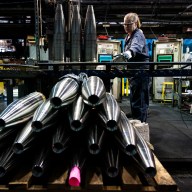Laura Dern collects unique filmmakers like trinkets. Over her career she’s worked with David Lynch, Todd Haynes, Paul Thomas Anderson, Jonathan Demme, Robert Altman, Steven Spielberg and more. She places Kelly Reichardt (“Wendy and Lucy,” “Meek’s Cutoff”) right up there with them. In the filmmaker’s latest, “Certain Women,” she takes the lead in one of the film’s three stories. (The others star Michelle Williams, Lily Gladstone and Kristen Stewart.) Her character, named Laura, is a lawyer whose wronged client (Jared Harris) winds up involving her in a hostage situation. It sounds powder-keg, but Reichardt is more interested in the deceptively mundane moments. It’s a quiet film, unlike any out there. And for Dern, 49, that’s what excites her about screen acting. RELATED: Interview: Kristen Stewart talks “Certain Woman” and how we all need to relax One thing I love about Reichardt’s films is how much they dwell on in-between moments, when it seems like not much is happening but so much actually is. You seem to love working with filmmakers who have unique — often very, very unique — voices. I think on a film like this, if you gave it a lot of money it would take something away from it. It needs to be small. And you do that, too. Your father came up during the Golden Age of that kind of communal filmmaking. It’s important to make mistakes sometimes. That’s how you learn. I wanted to ask about one of your first films, “Ladies and Gentlemen, The Fabulous Stains,” from 1982, starring you and Diane Lane as an all-girl teen punk band. I recently watched it for the first time and it’s so great. [read clip below] Follow Matt Prigge on Twitter@mattprigge
She’s definitely interested in what we usually don’t see. What we often don’t see is often what we missing in people: what they’re actually feeling and what they’re going through, but which is not what’s being spoken about. For me, it was a very exciting education in not simplicity — that’s something I strive for no matter who I’m playing — but the character has a very specific kind of simplicity. The aspect she looked at with my character was that she doesn’t necessarily lead with empathy. There’s a real journey toward how to become empathetic. She’s really just going through the routine of her life and trying to be detached. It’s helped her in her work. It’s interesting as an actor to make the choice to not feel. [Laughs] It’s a bit counter-intuitive, and Kelly was a great guide with that.
I’m such a fan of film, and I’m such an admirer and advocate for filmmakers making their visions. We have so few that really want to tell stories the unique way they want to tell them and will do whatever it takes to do that. Kelly is as fiercely true to that as anyone. She knows that if she wants to do it this way, it will have to be in a certain budget in a certain way, very run-and-gun. But she’s going to make her movie. I’ve had that experience with David Lynch for my whole adult life. It’s a beautiful thing when you get to witness that commitment to your vision. To be part of that vision, to be a collaborator in someone’s voice that’s particular and individual — that’s why we do what we do.
It’s true. There’s a closeness and an intimacy that working in small independent films gives you. You’re all working together. Everyone’s there for love, from the person cooking to the people working together. Nothing is precious. We’re all sharing one space to change and get hair and make-up done. You feel like you’re doing a play. My dad [Bruce Dern] is a real inspiration for me in this area. It doesn’t matter what the scale of the movie is or the kinds of people he’s working with. He gets his hair and make-up done, then he sits on an apple box and spends time with the crew until they’re ready him. He’s not a guy who goes off in his room and waits for the call. He loves being in the mix, because he loves watching storytellers do their work. That’s beautiful.
I do. It shifts a little when you become a parent. You’re juggling babies in the trailer and being on the set. I’m always there unless I have my kids with me, too.
That’s still happening, with Kelly and Paul Thomas Anderson, David Lynch, Todd Haynes, Jonathan Demme. You’re there. You want to be there. You’re there to invent and try things that won’t work, try things that will never be seen. But they’re your way into what the story is and who the characters are. The takes that don’t work are sometimes more important than the takes that are used.
It’s not about nailing the take sometimes; it’s about finding it. It’s lucky when directors know that and want to have that. It’s not about 15 takes; it’s about two or three. It’s about being given room to explore versus getting it right or doing a good job. That’s why sports were always so weird to me: I didn’t really understand winning and losing. That shouldn’t be a part of creativity. It’s challenging, because awards have become such a massive part of the arts. But it should be about celebrating all different kinds of work. There’s no losing in the game of art; it’s just expression.
That’s awesome. It’s so crazy, right? It’s amazing to watch it in terms of fashion and style. It was about this moment in culture, but it was so ahead of its time in some ways. It was pre-Madonna. My childhood!


















